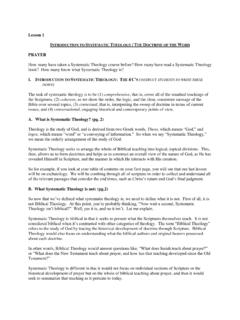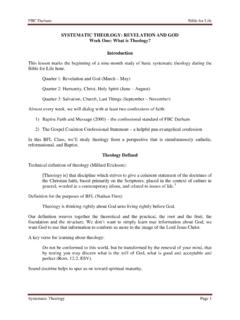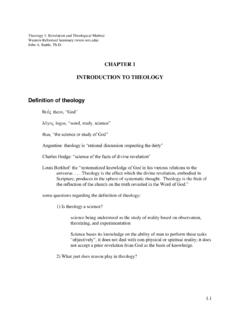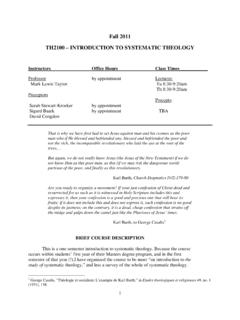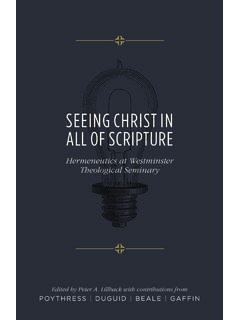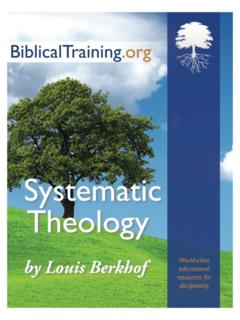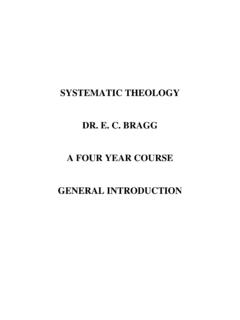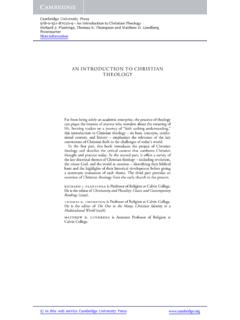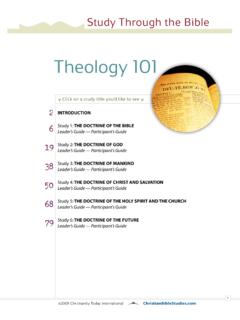Transcription of Grudem Systematic Theology Notes - First Baptist Boynton
1 Systematic Theology A Brief Introduction Texts The Bible - English Standard Version or New American Standard Wayne Grudem , Systematic Theology Theology - Introduction- Biblical- Doctrine/dp/0310286700/ref=sr_1_1?ie=UTF 8&qid=1430253586&sr=8- 1&keywords=wayne+ Systematic + Theology Selected Readings (assigned during the course) Description This course will follow the outline of Wayne Grudem s Systematic Theology . It is designed to introduce the students to the major topics, doctrines, and approaches to the discipline of Theology . Requirements Each student will be required to: Read and make Notes on the assigned topic. Be prepared to engage in discussion of the current reading.
2 Make brief teaching outlines. Course Outline Chapter 1: Introduction to Systematic Theology PART 1: THE DOCTRINE OF THE WORD OF GOD Chapter 2: The Word of God What are the different forms of the Word of God? A. Jesus Christ (John 1:1; Heb. 1:1- 3; Rev. 1913) B. God s speech (Gen 1:3; Ps 33:6) C. God s word in human speech (Dt 18:18- 20; Jer 1:9) D. God s word in written form, The Bible (Ex 31:18; Dt 31:9- 13; Josh 1:8) Chapter 3: The Canon of Scripture What belongs in the Bible and what does not belong? Chapter 4: The Four Characteristics of Scripture: (1) Authority How do we know that the Bible is God s Word?
3 Mechanical dictation, is the theory that God literally dictated every individual word that he desired the human biblical author to record. Dynamic equivalence is the theory that God only introduced basic ideas to the human authors who, in turn, use their own words to describe God's general concept. Insofar, as we have rejected the teaching of mechanical dictation and dynamic equivalence we turn to B. B. Warfield's definition of inspiration in our understanding of how God has produced the Scriptures we would say it was through the instrumentality of the man who quote steak from him." More specifically, it was through an operation of the Holy Ghost on these men which is described as quote bearing" them (2 Peter 1:21).
4 By citing 2 Peter 1:19 21, Kevin DeYoung records: First , Scripture is the word of God. It is like a redundant statement, but he is statistically important. Some Christians, influenced by a neoorthodox theologians like Karl Barth, are hesitant to say the Bible is the word of God instead, they argued that the Bible contains the word of God, or becomes the word of God, .. This distinction, however, would have been foreign to the apostle Peter, for all the lofty claims he makes about prophecy" or the prophetic word" are made with reference to the written words of Scripture. All of this matters, because it means the authority of God's word resides in the written text the words, the sentences, paragraphs of Scripture, not merely in our existential experience of the truth in our hearts.
5 Some people don't like written texts and propositions because they imply a stable, fixed meaning, and people don't want truth to be fixed. They would rather have inspiration be more subjective, more internal, more experiential. But according to a 2 Peter 1:19 21, the inspiration of holy Scripture is an objective reality outside of us. ( Taking God At His Word, pp. 34- 35.) Give particular attention to Grudem s rebuttal to the Circular Argument rationale. Be prepared to reproduce it. Frame argues for a linear conception to avoid the accusation of circular but they appear to be kissing cousins at best.
6 See, Five Views p. 210 and 217. It looks like this: God s rationality [I interpret, his intention to redeem] is the rational basis for planting faith in the heart or human faith, which is the rational basis for human reasoning. In other words [my words] we are not saying, as a circular argument: I believe that the Bible is the authoritative word of God, because God declares it to I know that because it says so in the Bible. Instead: we are saying God s rational decision to extend his kindness, forebearance, and patience to some by granting faith to believe, provides the rational ability to know him and obey his word.
7 Frame s intention: If faith is in accord with God s own thought, then it will also be in accord with human reasoning at its best, which images God s. Five Views p. 210 See a fuller treatment in Frames, Apologetics to the Glory of God. But are we not still forced to say, God exists (presupposition), therefore God exists (conclusion), and isn t that argument clearly circular? Yes, in a way. But that is unavoidable for any system, any worldview. To which, William Lane Craig replies: It is difficult to imagine how anyone could with a straight face think to show theism to be true by reasoning, God exists.
8 Therefore, God exists. Not is this said from the standpoint of unbelief. A Christian theist himself will deny that question- begging arguments prove anything. (VW p. 233) The Inerrancy of Scripture The inerrancy of Scripture means that Scripture in the original manuscripts does not affirm anything that is contrary to fact. Phenomenal language or speech, upholds the truthfulness of Scripture by confessing that the Bible speaks in understandable ways from the standpoint of the speaker. Therefore it is not inaccurate to say that the sun rises or the sun sets. What are some other examples of the way the Bible speaks in consistently with the way mankind describes the world and those things in it (cf.)
9 Numbers, measurements, and time citations)? Why does Grudem defends the term Inerrancy? 1. Inerrant and infallible 2. Faith and practice 3. Scientific precision 4. Term not used in the Bible 5. We have no original manuscripts 6. Accommodation and condescension without compromise 7. Overemphasizes the Divine nature over the Natural 8. Transcription errors Do we have a trustworthy or reliable text even though we don t have the original manuscripts? See Norman Geisler, A General Introduction to the Bible pp. 113- 125, and with Thomas Howe, When Critics Ask p. 181. Are there any errors in the Bible?
10 See Frame, The Doctrine of the Word of God Chapters 28 & 33, for a complete discussion. Chapter 6: The Four Characteristics of Scripture: (2) Clarity (Perspicuity) Can only Bible scholars understand the Bible rightly? While some parts are more difficult than others (2 Peter 3:15- 16) and the man of God must be diligent to study (2 Tim 2:15), the Bible self- disclosure indicates that it can be understood by all (Dt 6:4; Josh 1:8; Psalm 1). However that clarity is restricted to the people of God who are spiritual because the Bible is spiritual (1 Cor 2:14) and obedient (Js 1:22).
